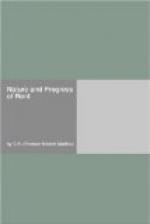In proportion, therefore, as the relative state of prices is such as to occasion a progressive fall of rents, more and more lands will be gradually thrown out of cultivation, the remainder will be worse cultivated, and the diminution of produce will proceed still faster than the diminution of rents.
If the doctrine here laid down, respecting the laws which govern the rise and fall of rents, be near the truth, the doctrine which maintains that, if the produce of agriculture were sold at such a price as to yield less net surplus, agriculture would be equally productive to the general stock, must be very far from the truth.
With regard to my own conviction, indeed, I feel no sort of doubt that if, under the impression that the high price of raw produce, which occasions rent, is as injurious to the consumer as it is advantageous to the landlord, a rich and improved nation were determined by law, to lower the price of produce, till no surplus in the shape of rent anywhere remained; it would inevitably throw not only all the poor land, but all, except the very best land, out of cultivation, and probably reduce its produce and population to less than one tenth of their former amount.
From the preceding account of the progress of rent, it follows, that the actual state of the natural rent of land is necessary to the actual produce; and that the price of produce, in every progressive country, must be just about equal to the cost of production on land of the poorest quality actually in use; or to the cost of raising additional produce on old land, which yields only the usual returns of agricultural stock with little or no rent.
It is quite obvious that the price cannot be less; or such land would not be cultivated, nor such capital employed. Nor can it ever much exceed this price, because the poor land progressively taken into cultivation, yields at first little or no rent; and because it will always answer to any farmer who can command capital, to lay it out on his land, if the additional produce resulting from it will fully repay the profits of his stock, although it yields nothing to his landlord.
It follows then, that the price of raw produce, in reference to the whole quantity raised, is sold at the natural or necessary price, that is, at the price necessary to obtain the actual amount of produce, although by far the largest part is sold at a price very much above that which is necessary to its production, owing to this part being produced at less expense, while its exchangeable value remains undiminished.
The difference between the price of corn and the price of manufactures, with regard to natural or necessary price, is this; that if the price of any manufacture were essentially depressed, the whole manufacture would be entirely destroyed; whereas, if the price of corn were essentially depressed, the quantity of it only would be diminished. There would be some machinery in the country still capable of sending the commodity to market at the reduced price.




